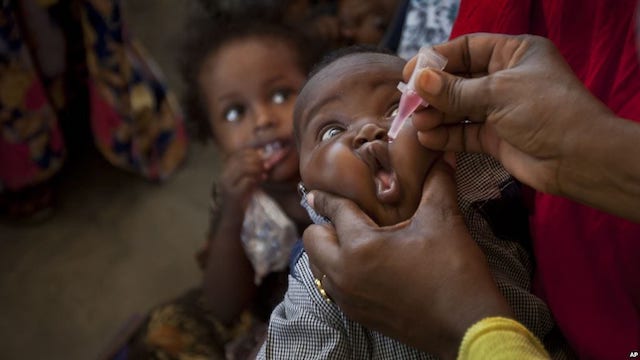An outbreak of polio has been confirmed in Ghana’s Northern region town of Chereponi 10 years after the West African nation was declared free of the disease.
Health officials in that country says the virus was detected in a two-year-old girl who was on admission at the Chereponi District Hospital in July.
“The Ministry of Health/Ghana Health Service has received report of confirmed Poliomyelitis from the National Polio Laboratory, in the sample from a two (2)-year eight (8) month old girl with Acute Flaccid Paralysis (AFP) from Andonyama in Chereponi sub-district of Chereponi district in the Northern Region. The child was seen at Chereponi District Hospital on July 27 with sudden onset of weakness in both lower limbs. Stool samples were taken as part of routine polio surveillance on 27th July, 2019 and sent to the National Polio Laboratory at Noguchi Memorial Institute for Medical Research for laboratory investigations and the sample tested positive as per result received on 17th August, 2019,” a statement from the health service said.
Among other things, the Ghana Health Service said a team has been deployed to assist the regional and district teams to carry out a detailed investigation.
The service said it is “working tirelessly” with its partners to prevent, and protect against the spread of the highly infectious disease.
Polio has no cure and can lead to irreversible paralysis.
It mainly affects children under the age of five, and can only be prevented by giving a child multiple vaccine.
Symptoms include fever, fatigue, headache, vomiting, neck stiffness and pains in the limbs.
It also has the potential to cause paralysis of the limbs which can be permanent. People who live in poor sanitation are at high risk of contracting polio.
“Safe and efficacious vaccine is available and complete vaccination is the main form of prevention. Parents and caregivers are advised to ensure that, their children receive the full complement of vaccination,” the Ghana Service noted.
Last month, the Ghana Health Service issued a similar alert that it had discovered a rare type of polio, poliovirus type-2, within the Tamale Metropolis in the Northern Region.
The health authorities observed the virus in a sewage drain in Tamale.
GHS explained in the alert that the virus which had been eradicated from humans, but has recently resurfaced and observed only in the Tamale area.
By J. Ofori, Daily Mail GH





